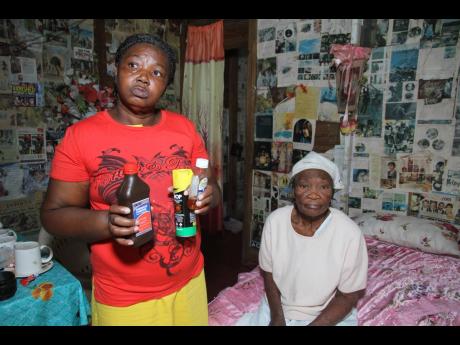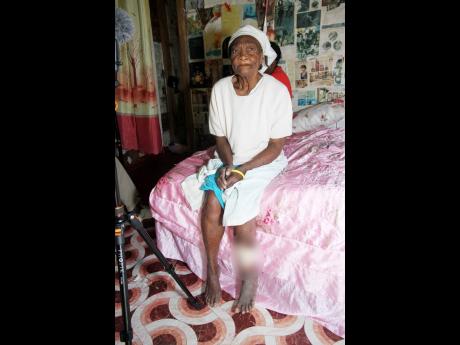Elderly woman endures decades-old struggle with ‘bad foot’
Eighty-two-year-old Mary O'Conner Nelson, of Arthur Seat in Crofts Hill, Clarendon, has been living with a 'bad foot' since she was a child and seems to have no hope of it ever getting better.
The condition of the senior citizen's foot is not for the faint-hearted. The massive open sore on her left foot is partially covered with a piece of cloth. Despite her caregivers' best efforts, the wound attracts flies, which appears to be the reason maggots sometimes form in the affected area.
Family members have been using insecticide to get rid of the worms as they are convinced that the decades-old sore was caused by evildoers and cannot be cured through the work of doctors.
"Dem set bad foot and a me ketch it," O'Conner Nelson said as she sought to explain her condition. She said that she has been to doctors on many occasions in the past, but they have been unable to help her.
Pearline Nelson, one of O'Conner Nelson's four surviving children, said that the doctors at one stage recommended that the leg be amputated but her mother said no. Instead, the family members have been administering home care, which is aimed at reducing the stench that comes from the sore, spraying with insecticide to kill the maggots, and sanitising with hydrogen peroxide and Savlon.
"Sometimes it heal up, but when the plague in deh it just eat it up back, and it run the bloody water," said Nelson who, like her mother, is of the deep-seated belief that her sickness is beyond modern medicine.
"Dem gi har bad foot. Dem sey a something she step pon one morning when she come out early, so a from she a little girl she step pon something," Nelson said.
Similarly, the senior citizen is strong in her conviction that God will provide her healing. She said that at times when the leg hurts, she calls on God for deliverance and the pain normally subsides.
"He's a Mighty God, we thank him for everything," said O'Conner Nelson, who mothered 13 children.
She told THE STAR that doctors never told her why she has the 'bad foot', even as she lamented that, "Wah injection me get more dan weh John read bout".
Asked whether they are prepared to seek medical intervention once more, Nelson noted that her mother is not very mobile and that she would experience difficulties securing transportation.
According to the daughter, taxi operators in the area have said that they will not carry her mother because of the condition of her foot.
But both mother and daughter believe that a visit to the doctor would be an exercise in futility.
"Dem gi him a bad foot fi it nuh well. A nuh foot fi well dem give him," said Nelson, who added that her mother does not have blood pressure or diabetic problems.
And despite her issues, O'Conner Nelson appears resigned to the fact that she may spend the rest of her life having her leg being sprayed with insecticide and dosed with disinfectant.
"Mi nuh waah nuh doctor look pon it, mek dem guh cut off me foot," she muttered. "Me a stay here wid it."
However, Dr Richard Watson, a general practitioner based in May Pen, Clarendon, when contacted by THE STAR on the matter, said that it is important for O'Conner Nelson to seek medical care. He also urged her caregivers to stop applying insecticide to the affected area.
"Insecticides are not for humans," the doctor said.







































